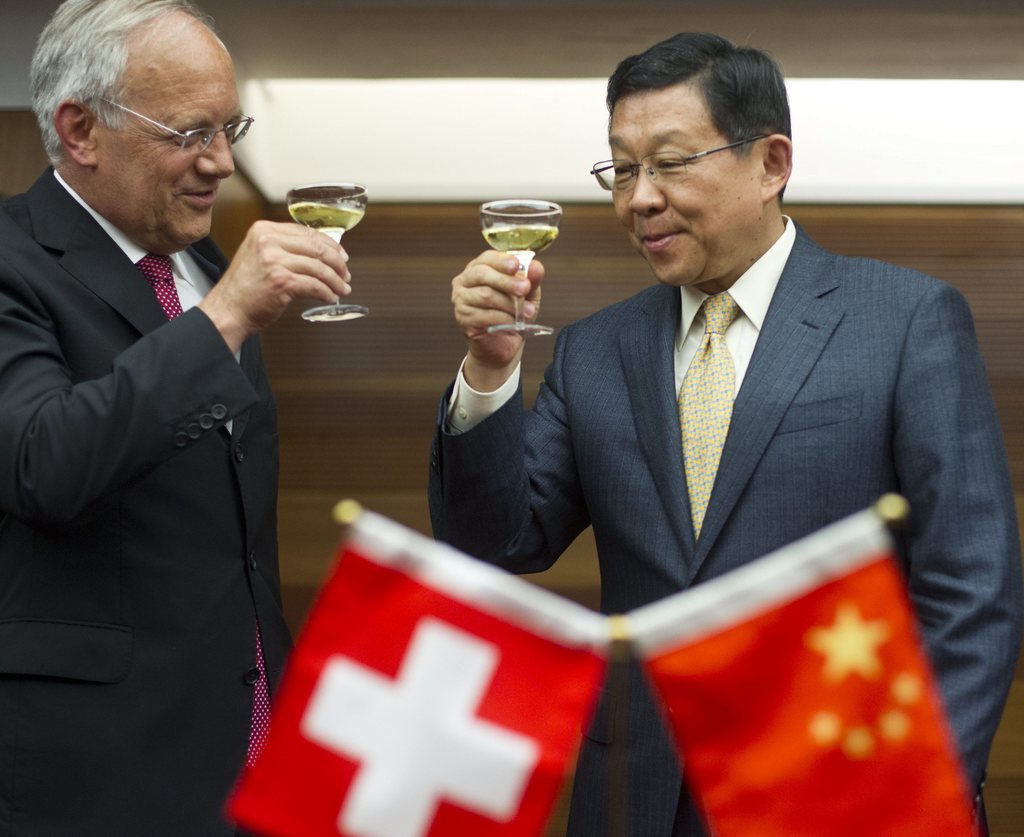Swiss minister hails trade deal with China

Economics Minister Johann Schneider-Ammann has praised an accord reached in principle with China. He is confident of winning approval of the free trade deal in parliament.
Switzerland found “good solutions” on a broad range of issues and did not have to make concessions in “sensitive areas”, particularly for the Swiss agriculture sector, Schneider told a news conference following Wednesday’s regular cabinet meeting.
He refused to make public further details of the accord ahead of a planned visit to Switzerland by the Chinese Prime minister, Li Keqiang, later this month.
However, Schneider-Ammann said he was optimistic that critics of the accord, notably the farmers and the food industry, would be convinced by the results of just over two years of negotiations with China.
A final round of talks ended last week at a technical level. The deal is still to be signed by the government pending approval by parliament.
Schneider-Ammann stressed the importance of the accord with Switzerland’s third major trading partner behind the European Union and the United States.
“China is an important destination for the export industry and it allows us to improve our market diversification,” he said.
Switzerland will also get privileged access to China’s political authorities, according to Schneider-Ammann.
Experts say the Swiss pharmaceutical and chemical industry, the engineering and watchmaking sectors, as well as the food producers and tourism stand to benefit from the deal.
Switzerland in 1972 agreed a key trade accord with the EU and the European Free Trade Association.
It also concluded 26 similar accords with 35 other partners outside EU according to the State Secretariat for Economic Affairs.
Further deals on commercial relations are planned with a number of other countries, including India.
Experts have described the deal with China as the most important for Switzerland in 40 years.
Human rights, agriculture
Schneider-Ammann said the scheduled visit by a top Chinese government delegation helped speed up the conclusion of the negotiations after nine rounds of talks among experts.
Several newspaper reports over the past few months indicated that negotiations were going slowly. In March, Schneider-Ammann was quoted as saying “a few hard nuts” still had to be cracked.
However, Schneider Ammann was adamant that Switzerland has not made any last-minute concessions.
He added that a solution had been found to address human rights issues in the deal.
Rights groups have voiced concern that a failure to agree clear rules in the accord with Switzerland might serve Beijing as a pretext to ignore the human rights in a planned trade deal with the EU.
For their part, farmers and the food industry in Switzerland have warned that the country would be flooded with Chinese agricultural products, putting additional pressure on producers in Switzerland and undermining health and hygiene standards.
US trade
Schneider-Ammann denied rumors that Switzerland was keen to negotiate a similar free trade accord with Washington.
“We have no intention at the moment to enter negotiations with the US on a free trade accord,” he said.
Swiss politicians have warned of a negative impact of ongoing negotiations between Washington and the EU on Switzerland’s export industry.
In February Schneider-Ammann called for a level playing field for the Swiss industry to remain competitive.
A previous attempt to reach a free trade deal with the US was stopped by the Swiss government in 2006.

In compliance with the JTI standards
More: SWI swissinfo.ch certified by the Journalism Trust Initiative














You can find an overview of ongoing debates with our journalists here . Please join us!
If you want to start a conversation about a topic raised in this article or want to report factual errors, email us at english@swissinfo.ch.